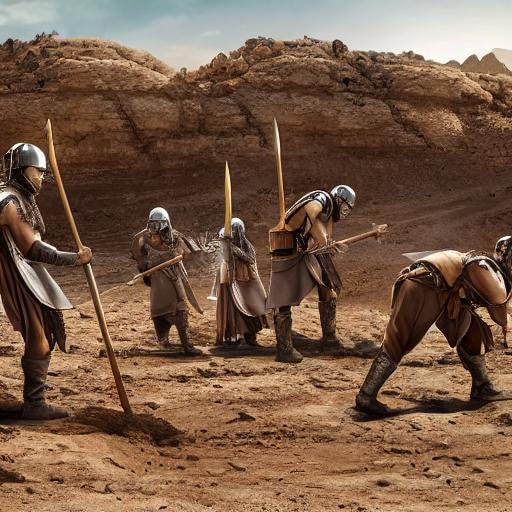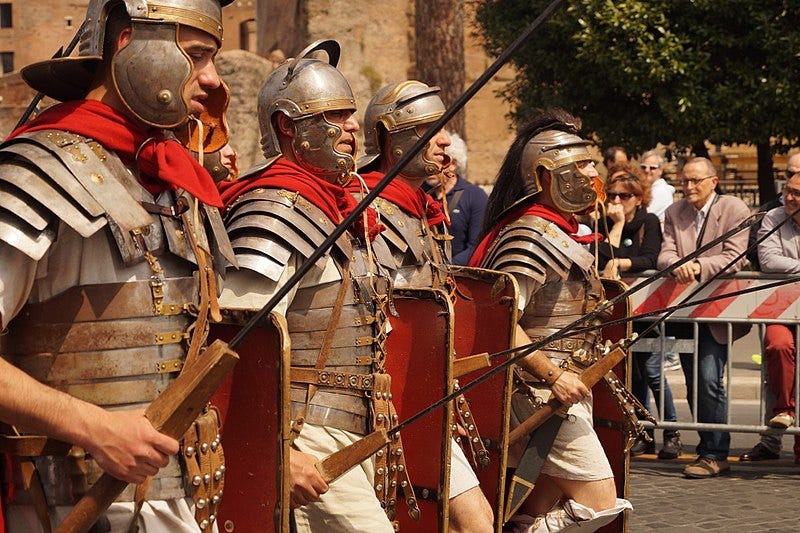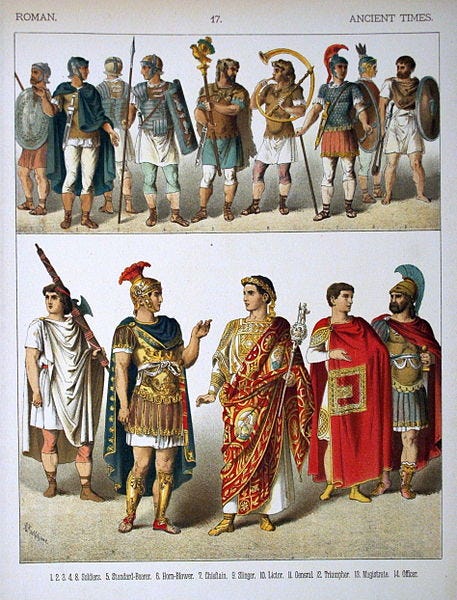Roman Roast Lamb and the Treasure Digging Legionnaires of Pompey
That time when Pompeius Magnus's legionnaires ignored orders and started digging for treasure. And a little about feeding the cohorts.
This week’s story happened to Pompey in about 81 BC.
Pompey the Great (Gnaeus Pompeius Magnus) was one of the great statesmen and generals of the late Roman Republic. He was born in September 29, 106 BCE in Rome and died in September 28, 48 BCE, in Pelusium, Egypt.
Early Career
At the time, the Republic was torn in a struggle between two other powerful men – Marius and Sulla. The son of a provincial noble who became senator in 89BC, Pompey inherited not only the wealth but also the loyalty of his father’s legions. At the age of only 23, he joined the civil war on Sulla’s side.
As Sulla took over the power in Rome, he rewarded the young general by giving him the hand of his stepdaughter. Sulla also entrusted Pompey with pacifying the remains of Marius’ supporters on the islands of Sicily and Sardinia.
Marius’s followers had gathered a large army in Africa, where Pompey was sent next to deal with them. He defeated his enemies, but in the process, he also invaded Numidia and installed a Roman ally on the throne. Upon his return to Rome, he demanded a triumph. At first, Sulla refused it, since Pompey was not officially eligible for a triumph. However, after an uproar among both the military and the people, Sulla had to comply.
From this point on, Pompey was also called “Magnus,” meaning “the Great.” Pompey’s boyhood hero was Alexander the Great, so this suited him just fine.
After the death of Sulla in 78BC, the Republic was again threatened by revolts, especially in Spain, where the last followers of Marius had gathered and were defeated by Pompey after 5 years.
Consulship alongside Crassus
While this was going on in Spain, in 73 BC, in Rome, a Thracian slave named Spartacus started a revolt. What followed was a series of Roman defeats at the hands of Spartacus and his growing army.
It was only in 71 BCE that the legions led by Marcus Licinius Crassus defeated Spartacus’ forces. However, instead of Crassus, the honor fell on Pompey, freshly returned from Spain, who intercepted and wiped out the scattered bands of slaves. As a result of his victories, he was granted a second triumph.
So now Pompeius Magnus and Crassus were the two main political players in Rome. Both of them refused to disband their armies forced the Senate to approve them both as consuls in 70BC. Pompey was 35.
He then went ahead to deal with another problem the Roman empire had at the time: pirates in the Mediterranean. At first, Rome tolerated this piracy as it provided a great supply of cheap slaves, vital for its agriculture and mining industry. However, once the pirates started threatening Rome’s grain supply, driving the grain prices up, and causing food shortages, something had to be done.
With a colossal fleet to 500 warships, Pompey took care of that too, and many of the pirates were sent inland as farm workers, therefore diminishing the attraction of piracy.
While Pompey was busy hunting down pirates, the empire was involved in a long war against Mithridates VI of Pontus, a powerful ruler who held control over the entirety of Asia Minor and had a strong ally in the Kingdom of Armenia. A little funny story about this in the following newsletter.
When he wrapped up in the Mediterranean, Pompey turned his armies East and extended Roman dominion over most of the East.
When he returned to Rome in 61 BCE, Pompey was awarded his third triumph. It bigger, more lavish, and longer than any other triumph before; it lasted for two days.
So, at the time Pompey was
the conqueror of the East,
the victor in Spain,
the crusher of the slave revolt,
and the eradicator of piracy.

The First Triumvirate
Returning to Rome, he allied himself with another strong general and statesmen, one named Julius Caesar. Pompey had the military muscle, Caesar had the political connections, and Crassus, the richest man in Rome, had the cash.
This is how the First Triumvirate was born in 59BC. It was a mutual arrangement that allowed its members to bypass the Senate and rule the Republic together.
However, it did not last long, until tensions started appearing and in 53BC, with Crassus’s death. He was killed by the Parthians, by poring melted gold in his mouth, to mock his cupidity (does it ring a Game of Thrones bell?).
Pompey and Caesar were now on a collision course. There followed a civil war between the last two members of the Triumvirate and in the end Pompey was defeated and Caesar took the power.
The Treasure Hunting Legions
The story I really wanted to get to happened during Pompey’s campaigns in Africa around 82-81BC. Sulla had ordered him to sail to Africa against Marius’ followers.
So he took his legions and supplies, with 120 galleys and 800 transports and landed part of his army at Utica and part around the now Roman city of Carthage.
No sooner had he landed, than seven thousand of the enemy deserted and came over to him; and his own army contained six complete legions.
This impressive number of troops was all stationed around Carthage.
One day, a few of the men came across some treasure in the area and as it went, word quickly spread on the legion grapevine about hidden gold to be found. Soldiers and gold? You can guess what happened next.
The swords, helmets and shields were packed away into the tents and the pickaxes and shovels were picked up. And the whole army started digging.
Pompey was unable to make his men pack up and move on with the job they were supposed to be doing, because they flatly refused and carried on digging holes looking for hidden gold and precious gems.
So he went from group of digging soldiers to group of pickaxing soldiers, asking them constantly how the treasure hunt is going and laughingly advising them to maybe dig a little more to the South, or a little more to the North.
Or maybe the guys over the hill had more luck? He just stood by smiling as the soldiers hurried left and right to get more treasure for themselves.
This went on for several days until the whole area was pockmarked with holes. Unsuccessfully, it would appear. Tired of digging around without any hope of becoming richer than the senators of Rome, the soldiers eventually gave up and went to Pompey and told him to lead them where he pleased, assuring him that they had been sufficiently punished for their folly.
So the treasure hunting tools were packed away and the diggers once again emerged from the tents as soldiers and the campaign was resumed.
(source The Parallel Lives by Plutarch)
Feeding the Soldiers
The legion’s food while on the march consisted mainly of plain boasted or boiled meats (whatever was available), and bread cooked on charcoal. The soldiers would usually grind their own grains for the bread.
The most common grain was barley, which as you can imagine, was far more favoured by the horses than the men. Wheat was somewhat more rare. In fact, barley was issued to soldiers as a form of punishment, when wheat was the norm.
For drink they had something called posca, which was most likely a mix of water with wine or sour wine or even wine vinegar with any herbs which were on hand.
One of the things they apparently ate was cooked lard, in the recipe below.
Recipe: Laridi Coctura (cooked lard)

Boil lard (pretty much smoked pork fat, not to be confused with bacon) covered in water with plenty of dill, drizzle a little oil and a little salt.
The next recipe is something which would have been cooked in more stationary circumstances, not on the march.
Recipe: Roast lamb or kid
'Marinated kid or lamb: 1 pint milk, 4 oz honey, 1 oz pepper, a little salt, a little asafoetida. For the sauce: 2 fl oz oil, 2 fl oz fish sauce, 2 fl oz honey, 8 crushed dates, half pint good wine, a little starch’
Ingredients
• Shoulder of kid or 1.25 kg leg of lamb
• Olive oil
Marinade
• 570ml milk
• 120g honey
• 1 tbsp pepper
• Salt
• 1/2 tsp asafoetida powder or 5 drops asafoetida tincture (you can use garlic or onion powder as a substitute)
Sauce
• 8 crushed fresh or dried dates
• 280ml red wine
• 4 tbsp olive oil
• 2 tbsp clear honey
• 4 tbsp fish sauce
• a little corn starch
You'll want to marinate the meat overnight. Combine the marinade ingredients and leave the meat overnight. At the same time, soak the fresh or dried dates in a little red wine.
The next day remove the meat from the marinade, pat it dry, and then roast it in an oven pre-heated to 200°C/gas mark 6, well-seasoned and with olive oil.
The timing should be 20 minutes to each 1lb/450g and 20 minutes in addition. When the meat is nearly ready, pound the dates to a pulp and add to the remaining red wine, honey, fish sauce and oil. Bring to the boil in a saucepan and cook out briefly and then thicken with corn starch.
When the joint is cooked, remove it from the oven and leave to rest for 10 minutes before carving thick slices and serving with a little of the sauce on the side.









Learning about foods from antiquity is fascinating!